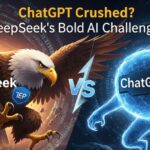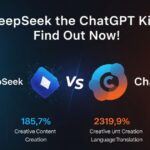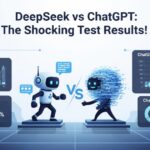The artificial intelligence race just took a dramatic turn—and the internet can’t stop talking about it. In a surprise development that’s sending shockwaves through the tech world, a fast-rising AI model has achieved results that many didn’t see coming. The battle of DeepSeek vs ChatGPT is reaching new heights, and one of them may have just set a new standard for what AI can do.
For years, ChatGPT, developed by OpenAI, has been the gold standard in conversational AI. Its ability to generate human-like responses, write creatively, solve problems, and assist with everyday tasks has made it the go-to tool for millions worldwide. From students and writers to developers and marketers, ChatGPT has been a reliable digital companion.
But recently, DeepSeek, a newer AI model developed with an open-source philosophy, has stunned the industry by outperforming expectations across multiple categories. In independent benchmarks and real-world use cases, DeepSeek is showing signs that it’s not just catching up—it may be pulling ahead.
According to a detailed analysis by AI research group ModelScope, DeepSeek demonstrated superior performance in multilingual understanding, real-time data analysis, and academic research queries.
While ChatGPT still leads in areas like tone generation, creative storytelling, and smooth conversational flow, DeepSeek’s ability to handle technical tasks with precision has impressed experts across the board.
This sudden leap in capability has reignited the ongoing debate: DeepSeek vs ChatGPT—who truly leads in 2025?
“I’ve used both extensively,” says Priya Nair, a machine learning engineer based in Austin. “ChatGPT feels more intuitive for day-to-day tasks. But when I need deep technical output or structured citations, DeepSeek is incredibly sharp.”
The contrast between the two goes beyond performance. ChatGPT operates under a closed-source model, with premium tiers and proprietary APIs. DeepSeek, on the other hand, is built with an open framework, giving developers more control, transparency, and customization options.
This open-access model is one reason why DeepSeek is gaining traction fast among startups, researchers, and international institutions. As users demand more ethical and flexible AI tools, DeepSeek’s approach appears to resonate strongly with a growing segment of the market.
Meanwhile, OpenAI isn’t standing still. With constant updates to ChatGPT, including improved memory, plugin support, and multimodal abilities (like image and voice), the model continues to evolve rapidly. Still, the AI world is taking serious notice of DeepSeek’s rise.
Google search interest reflects this shift. In the past two months alone, queries like “best AI model 2025,” “DeepSeek vs ChatGPT test,” and “DeepSeek AI review” have skyrocketed, signaling growing public curiosity—and perhaps a turning tide.
One thing is undeniable: DeepSeek’s performance has raised the bar, forcing even established players to step up. Whether it maintains this momentum or sparks the next wave of innovation, it has already made history.
The AI landscape has changed forever, and we’re only just beginning to see where this rivalry will take us next.







